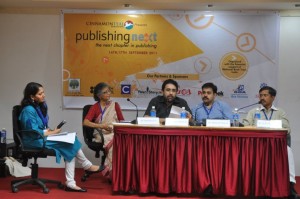G. R. Raghavender in his presentation gave a detailed report of the copyright Law, itemizing every aspect of the law and explaining the circumstances that led to those aspects being introduced. Mr. Raghavender elaborated on the amendments, provisions and exceptions of the law and the changes it has faced in due course of time.
Pranesh Prakash began his discussion with a provocative comment stating that ‘each one of us is a criminal and should be jailed. Every single day, we violate the copyright law, whether we know it or not.’. This he said to illustrate how so many provisions of the Copyright Law were meaningless in today’s environment and therefore needed a revision. He said that the one problem with the Copyright Law was its attempt to bring together a large variety of very different kinds of activities under one umbrella while people actually engage in these creative activities for very different reasons. Mr. Prakash further continued to elaborate on this topic enlightening the audience with the various issues that publishers and other artists face due to the Copyright Law.
Kannan Sundaram gave a satirical viewpoint of Tamil publishing industry. He stated that ‘my experience as a common Tamil publisher and the problems that I faced are so divergent from the independent English publisher.’ Using many instances, Kannan illustrated how the concept of Copyright was either misunderstood or abused in the non-English markets.
Mandira Sen, in her discussion mentioned some of the amendments of the law with regard to the business models of publishers and how they affect them. She stated that there were three pillars of publishing, the first pillar being the copyright protection law which protects the rights of the author from issues like piracy and others, the second, territoriality which protects the sale of the work over a certain geographical area and the third, royalty which the author receives for his work. In her presentation she briefly explained section 2(m) of the copyright law, 2010 and the impact it has on the publishing business model.
Vinutha Mallya concluded by stating that ‘in India there are no industry statistics for publishing which is, in fact, is urgently required. Longitudinal studies tell us the patterns in India; territoriality has been a cultural notion as much as it has been a geographical notion and that the dependence on foreign books for the education of students among Indian publishers will decrease with the advent of the changes’.
